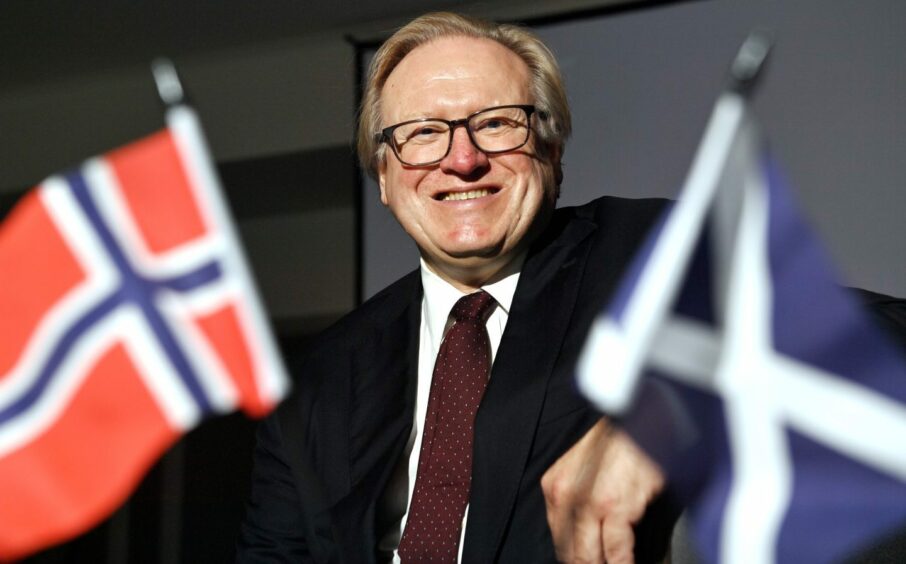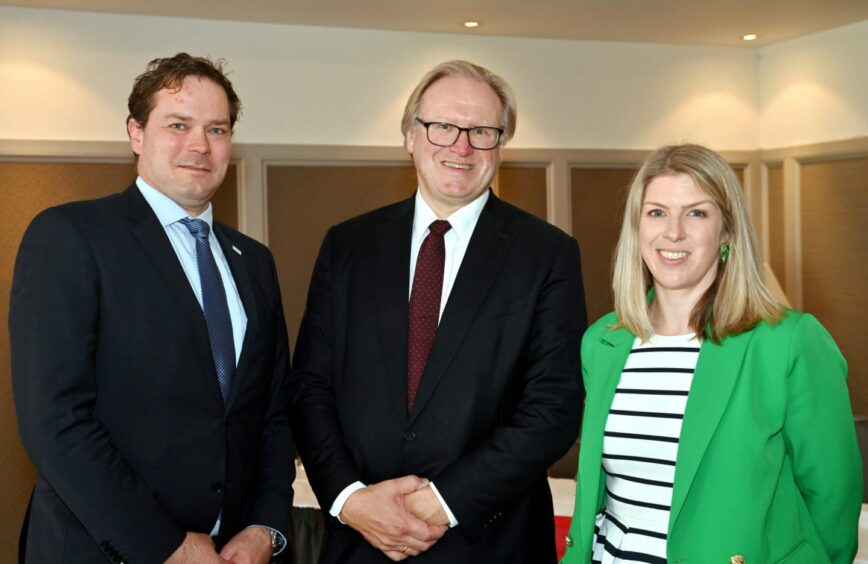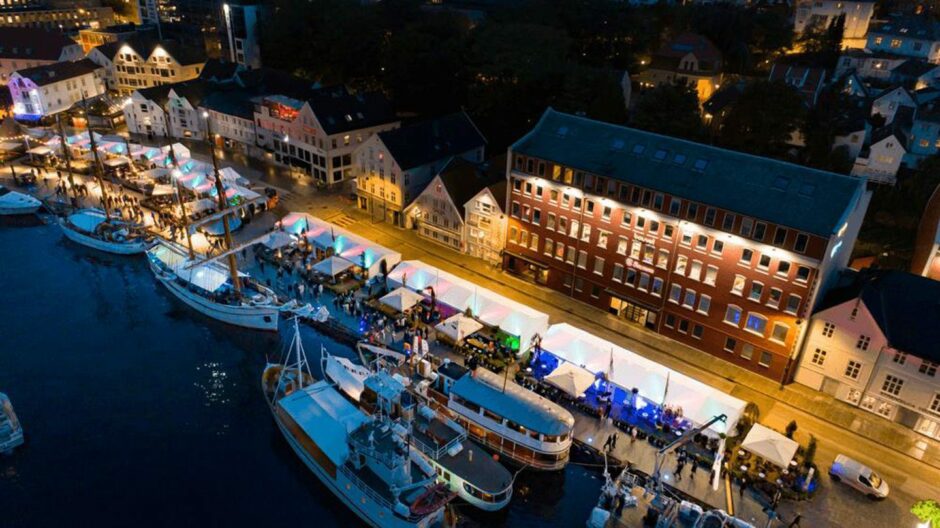
“Trust” is the theme of this year’s ONS conference, Stavanger’s biennial mecca for the offshore energy industry.
Returning this month following a Covid-induced hiatus and a virtual exhibition in 2020, the Norwegian Offshore Northern Seas exhibition is back with an all-star line-up.
Billionaire Elon Musk, the Crown Prince of Norway, and the great and the good of the oil and gas sector, including the CEOs of Shell, Equinor and TotalEnergies, will all be there for those making the migration to Stavanger.
And unlike plethora other exhibitions in the industry which have been delayed due to Covid, this event is not directly themed on energy transition.
Instead the organisers have asked themselves what’s needed to address that crucial issue alongside the ongoing energy security crisis in Europe.
Go the extra mile
President and CEO of the conference, Leif Johan Sevland, vice president Jon Are Rortveit and communications director Johanne Stenberg sat down with Energy Voice in Aberdeen to discuss the theme.
And delivering on the energy transition, navigating geopolitical tensions and ensuring different parts of the broad energy industry work together will all surely require one thing as their foundation…
“That’s never going to happen without trust, so it’s a bold theme,” said Rortveit.
“We always aim to overachieve, but obviously not having the 2020 event and coming back after four years, maybe there’s a certain degree of we’ve had a little extra motivation this time to really go that extra mile”
Sevland added: “There’s never been a greater need for a meeting place like ONS than we see today, because the changes are happening so fast.
“We had two different situations come up. When we started planning we saw the energy transition being the main topic, and that of course remains extremely important.
“At the same time we had war in Europe – the Russian invasion of Ukraine, which is terrible – and Europe also needs to find energy in a different way, so we have to discuss that.
“When we’re discussing what form energy supply to Europe should take in the future, which is a critical situation coming up, we also need to think about how we fulfill our ambitions to execute the energy transition. We can’t stop that due to what’s happening in Europe.
“So then trust is going to be extremely important where we are going.”
Can oil and gas be trusted?
With the theme established, there arises a question on whether the general public “trusts” the oil and gas sector to deliver this transition, while helping protect security of supply.
Though it may not be quite the pariah it was during the COP26 climate summit in Glasgow, for many the industry is losing a PR battle on its climate credentials, which could have consequences for its recruitment hopes.
Stenberg pointed to the ONS Foundation’s energy society committee, which looks to create debate and discussion around that very issue at the conference.
“I believe that oil and gas, but also the energy industry at large and maybe even the power companies now – we’ve seen the raising power prices – have a story to tell.
“We as a society perhaps haven’t been listening, but they haven’t been telling that story very well either.
“So I think we all pretty much have to get down from our high horses and speak to people as people and not ‘stakeholders’. We have to talk to them face to face like you would your mother-in-law or your brother.”
Sitting down and talking, establishing trust, can then help resolve these issues, so goes the argument.
World’s Energy Laboratory
Stenberg added: “The North Sea is pretty much the energy laboratory of the world right now. We’re going to see collaborations between oil companies, wind companies, hydrogen, and so on. Different HSE regimes, different ways of working.
“You’re truly in need of trust to make that happen. And we’re going to have several of our sessions on the just transition what do we do if you want to cut emissions in, let’s say Poland, where you have several coal factories and people working in the coal industry for several decades and then they they’re suddenly not allowed to be working in the coal industry?”
“Where do we put those people? What do we use their workforce for?
“So there is a need for trust for the authorities, the governments and people actually driving the change that they will have a job to go to.”
For Rortveit, there’s “definitely an ongoing communicational issue in terms of the energy industry and society at large”.
But there’s a better climate now to discuss “the math behind the transition” as people realise these topics aren’t a “quick fix”.
Sevland said: “We are a huge fan of the energy transition, we are supporting the energy transition, but we also know we’re going to need oil and gas from many decades.
“So recruitment in the industry is extremely important, and there’s no need to say that oil and gas is going to leave.”
No lost causes
Comms director Stenberg recalled a recent visit to the University of Stavanger, whose students said there is very little divergence between classes for petroleum engineering and other disciplines in new energies.
“I think the academic institutions and the energy industry themselves have a great task of bringing forward the narrative that you’re not a lost cause if you are a petroleum engineer or geologist.
“We’re going to need a lot of STEM-educated people, whether that’s work in oil, Carbon Capture and Storage (CCS) or batteries.
“That’s not for us to decide, but we definitely see that there are a lot of opportunities for people going the engineering line or the geology, or even the construction of it all.”
Show off Stavanger
Sevland, the former mayor of Stavanger and chairman of private equity group HitecVision, is keen to show off his city when the conference kicks off.
There’ll be events and discussions in “bars, yachts, restaurants” with around 900 speakers over the course of the four-day discussion.
The “flavour” will be similar to that of 2018 in terms of exhibition space and “plenty of people from all over the world coming in”.
Four years ago, ONS attracted 68,174 people from 98 nations around the world.
“This time it’s going to be even better,” said Sevland. “On yachts, on bars, on restaurants, on roofs, you will see people discussing and debating energy.
“There’ll be a lot of NGO’s, a lot of organisations, institutions coming in and setting up meetings in the evening as well, combined with music, great food, entertainment and discussions.
“It is going to be extremely busy.”
Recommended for you


 © Supplied by Kami Thomson/ DC Tho
© Supplied by Kami Thomson/ DC Tho © Supplied by ONS
© Supplied by ONS